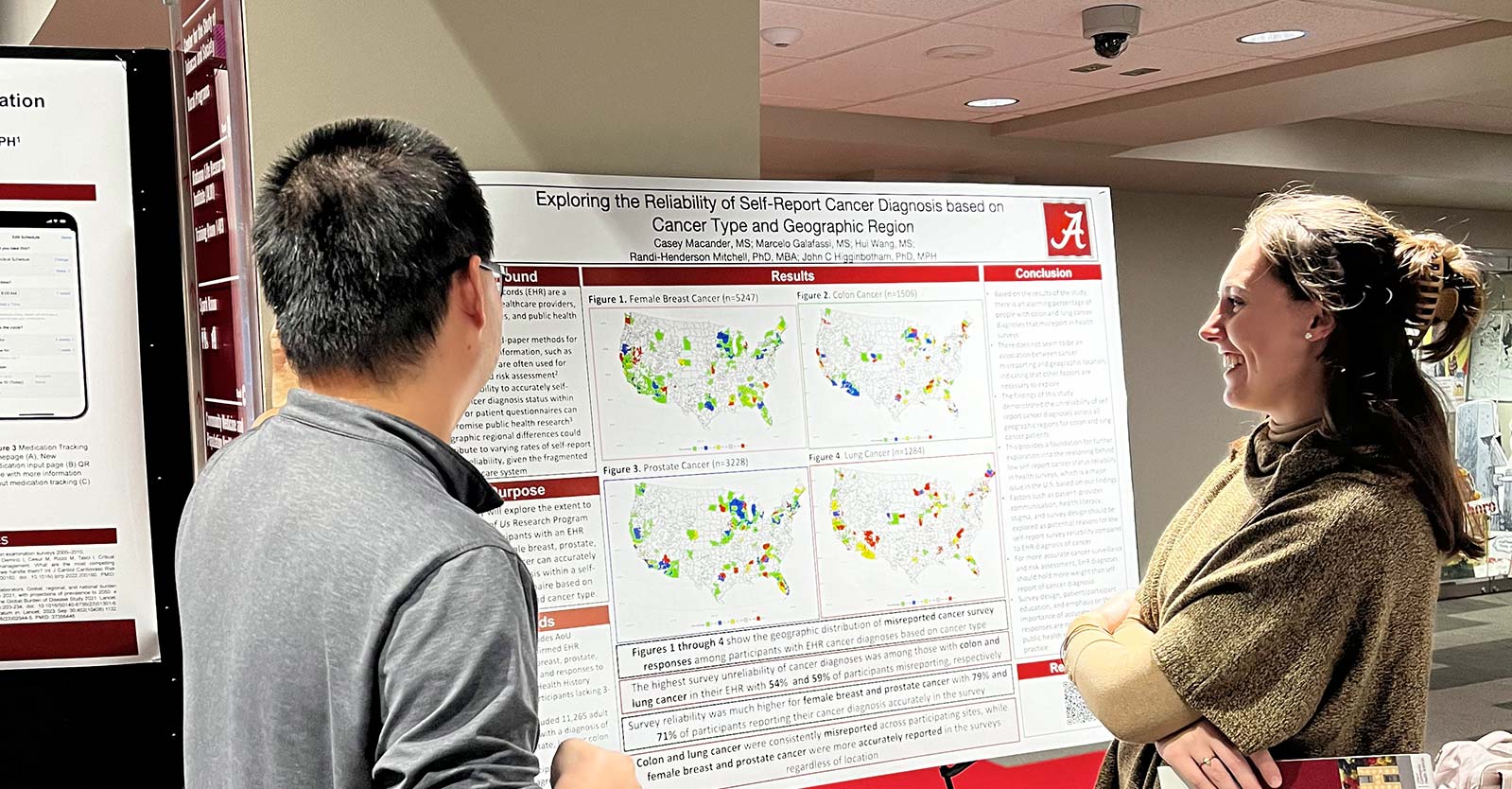Program Overview
Gain the knowledge you need as a physician, administrator, clinical researcher, health care professional or behavioral scientist to implement outcome-based strategies and improve the quality of care for your patients, while reducing costs and practitioner burnout.
Online Program Format
30 Credit Hours
$480 Tuition Per Hour
Make a Difference in the Changing Landscape of Health Care
The 30-credit-hour Master of Science in Population Health Sciences program can be pursued completely online, allowing you the flexibility to earn your degree around your own schedule. The curriculum is structured to be adaptable, allowing students to tailor their studies to individual interests, whether they pertain to clinical practices, social and behavioral health or the advancement of research infrastructure within their organizations.
Participation in this innovative program equips individuals with the skills to proactively address health care challenges affecting patients and communities across a variety of settings. Graduates are well-positioned to assume or advance leadership roles in clinics, hospitals, primary care offices and other health-focused environments that prioritize the delivery of improved care for individuals, patients and communities.
For those dedicated to research, the program encompasses coursework on critical topics such as qualitative research methodologies and data analysis techniques, ensuring comprehensive preparation for pursuing data-driven solutions. This degree serves as a robust foundation to enhance both personal career trajectories and the health systems to which graduates contribute, combining flexibility and innovation to achieve professional excellence.
| Application Deadline | June 15 for fall admission and November 15 for spring admission |
| Are test scores required? | Test scores are not required for applications |
| Scholarships and Grants Available | Discover a range of scholarships and grants to support your educational journey |
Curriculum
The online MS in Population Health Sciences program consists of 30 credit hours. Students have the option of completing a thesis or a capstone experience.
Please note that courses are subject to change. More information can be found in the Graduate Catalog listing.
Required Courses (18 hours)
- POPH 520 Essentials of Population Health
- POPH 521 Health Policy and Planning
- POPH 522 Biostatistics
- POPH 523 Basic Epidemiology
- POPH 524 Health Economics
- POPH 525 Outcome Research in Population Health
Non-thesis option
Complete 9 hours of elective courses and a capstone experience (POPH 595).
Thesis option
Complete 6 hours of elective courses and 6 hours of thesis research (POPH 599).
Elective Courses (6–9 hours)
- POPH 530 Introduction to Medical Care
- POPH 531 Interprofessional Health Communication
- POPH 532 Healthcare Finance and Reimbursement
- POPH 533 Healthcare Quality and Informatics
- POPH 536 Introduction to Qualitative Methods in Population Health
- POPH 537 Cultural Competency
An Overview of MS in Population Health Sciences
Admission
Population health is an interdisciplinary field, and our degree is beneficial for current licensed health professionals and systems administrators interested in health outcomes research, evidence-based care and health system redesign. This program is designed for aspiring health professionals and introduces these learners to the fundamental principles of population health and the U.S. health care system.
Applications are accepted for fall or spring admission. To be considered for admission to the program, applicants must provide a Statement of Purpose, three letters of recommendation, a curriculum vitae and academic transcripts from all institutions attended where 15 or more credit hours were earned.
The GRE or MCAT is not required for admission. Please note that for applicants with a GPA below a 3.0, an admission test score is strongly recommended to be considered for admission. International applicants will need to meet other requirements established by the Graduate School.
Your Statement of Purpose should address the following items:
- Describe your interest in population health.
- Explain how a population health degree fits into your career plans.
- Summarize your specific population health topics of interest and identify a possible faculty mentor from our department.
- Please note that you do not need to contact a prospective faculty member before admission into the program.
- Describe how your current or future work will advance our College’s mission and reflect upon the values of the College that are most important to you and your planned career in population health.
- If applicable, address weaknesses within your academic or professional background and explain how you will apply lessons learned from these challenges to help you succeed in graduate school.
Frequently Asked Questions about the MS in Population Health Sciences Online
I eventually want to go to medical school or get my PhD. Can this program help with that?
- Yes, students often use this program as a bridge program to medical school or other graduate learning opportunities. You’ll gain skills in research methods, health equity, health policy and evidence-based medicine that will prepare you for additional educational opportunities and the career path you choose.
What is the Capstone Experience?
- The Capstone Experience is a planned, supervised and evaluated work experience that complements the student’s classroom education. It allows students the opportunity to apply the lessons learned in their coursework. Students are responsible for completing 120 hours under the guidance of their preceptor and are required to document their completed hours on a regular basis.
What kind of jobs can I get with this degree?
- This degree is beneficial for licensed health professionals, systems administrators and others interested in health outcomes research, evidence-based care and health system redesign. Many of our graduates hold leadership positions within health care organizations, as well as public and population health program management roles in the government, private and non-profit sectors.
Is this program synchronous or asynchronous?
- The program is asynchronous, and we currently use Blackboard as our learning platform.


Student Spotlight
Inspiring stories of success from students and alumni.
Take a look at some of our UA Online stories.
Contact Us
Program Information
Sarah Hemphill
Admissions Representative 800-467-0227
sarahh.bama@ua.edu
Admissions Information
UA Online
800-467-0227
online@ua.edu










